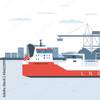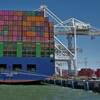With foreign steel now commanding nearly 32 percent of the U.S. market, it was inevitable that iron ore cargos hauled in U.S.-flag Great Lakes freighters (lakers) would take a hit, and that hit came in June, the Lake Carriers’ Association (LCA) reported. Cargos totaled 4.4 million tons, a decrease of 17 percent compared to May and 10 percent compared to a year ago.
“Although not unexpected, the slowdown in iron ore is troubling,” said LCA president James H.I. Weakley. “On average it takes about 1.5 tons of iron ore to make a ton of steel, so foreign steel that is dumped into the U.S. market takes ore and other cargos off the Lakes. It is imperative that the government enforce our trade laws, and if they are ineffective, our legislators need to enact ones that protect American workers and industries. Unfair trade has decimated the American steel industry and its suppliers more than once since the early 1980s. Even right now three U.S.-flag lakers that are well-suited to the iron ore trade are idle, and there’s little prospect they will see service this year.”
Weakley further noted that two blast furnaces in the Great Lakes region have been banked and two large iron ore mines, one in Minnesota and one in Michigan, have been idled. Other ore mines have scaled back production.
Foreign steel’s intrusion into the U.S. market has been growing steadily over the past few years. Just five years ago imports accounted for 20 percent of the market.
Shipments of all the various cargos in U.S.-flag lakers totaled 10.3 million tons in June, a decrease of 1.4 percent compared to a year ago. Even though limestone cargos increased 11 percent to 3,052,346 tons, that trade too felt the impacts of unfair trade in steel. Shipments of fluxstone, used as a purifying agent in the steelmaking process, were down because of unfair trade in steel.
Year-to-date, U.S.-flag carriage stands at 31.6 million tons, an increase of 17 percent over the iced-over first half of 2014, but 1.6 percent off the five-year average.













